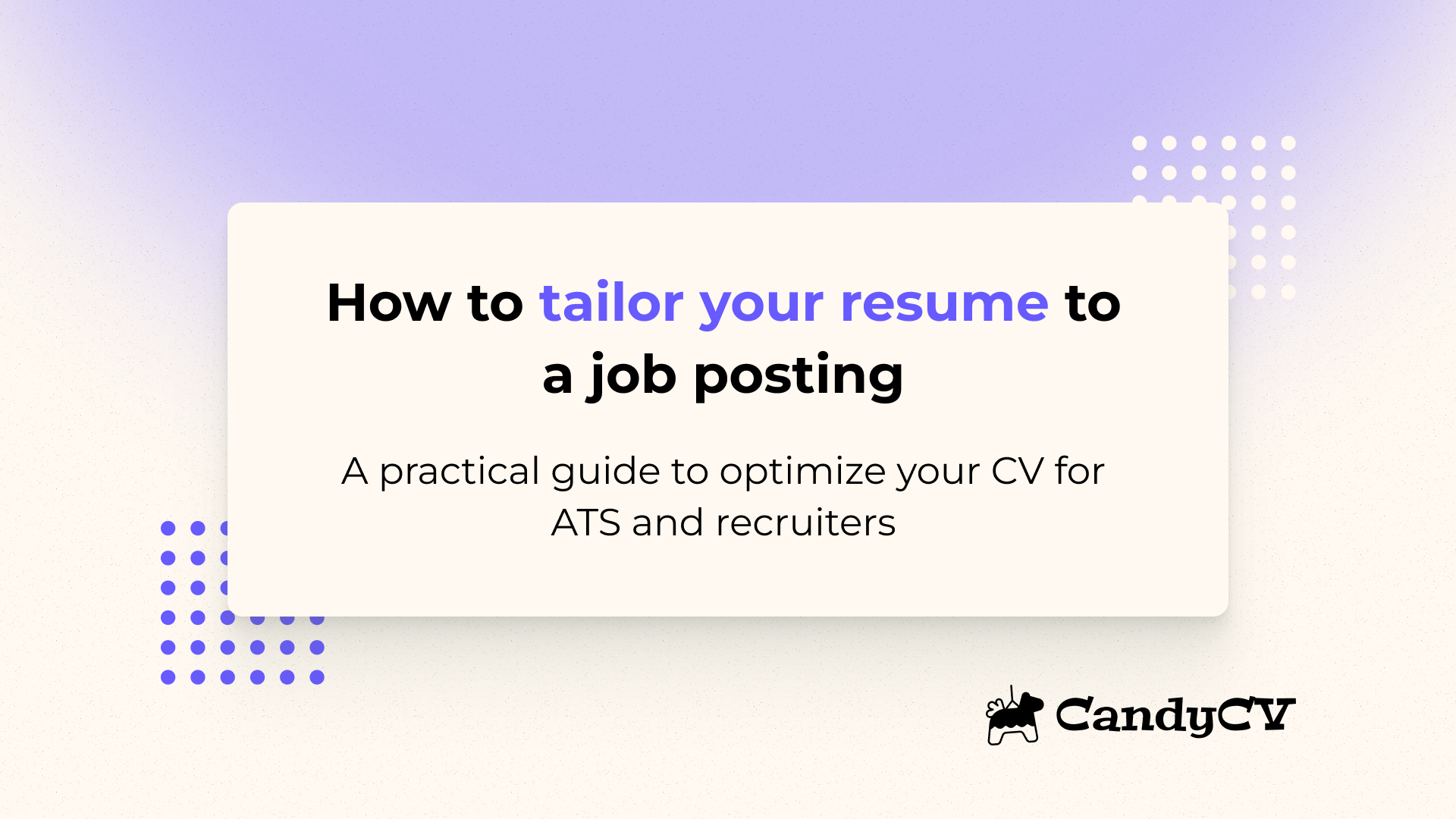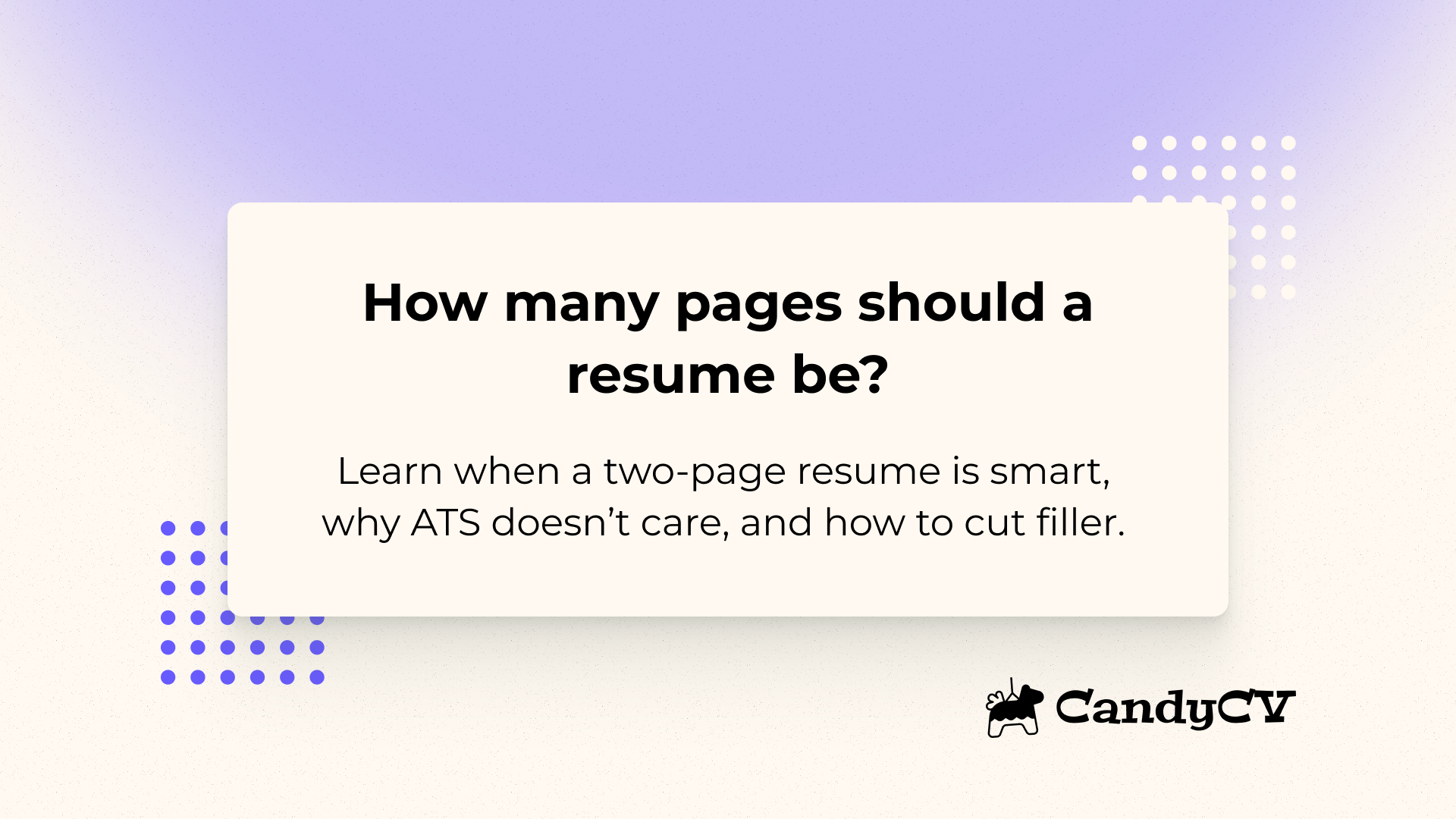
How long should a resume be? Guide to getting more interviews
Most candidates don’t lose interviews because their resume is one page or two. They lose them because of what often comes with that extra page: filler, bad priorities, and a professional story that isn’t clear in the few seconds recruiters and hiring managers actually give you.
So what’s the “right” resume length if you want to maximize interviews? And is it true that ATS systems penalize two-page resumes?
In this guide, updated for 2026, you’ll learn:
- Why a one-page resume can be extremely effective.
- When a two-page resume is a safe (and smart) option.
- Why three pages or more is usually a red flag (except in a few specific fields).
- How to cut your resume without losing impact.
- The common mistakes that make resumes longer and less credible.
Before you decide on length, make sure you’re clear on the fundamentals of effectiveness: how to write an effective resume that gets interviews.
One-page or two-page resume? The rule of thumb
If you want the short answer: one page, whenever you can. Not because shorter is “more correct,” but because shorter is often more effective. Fewer pages, more impact.
Here’s the practical rule:
- 1 page when a hiring manager can understand your fit and your value without sacrificing readability or omitting essential proof.
- 2 pages when you need room to show relevant signals (impact, complexity, leadership, projects) without cramming the layout or padding with fluff.
- 3+ pages only when your context truly requires it (academic/research CVs, publications, highly specialized long careers). For most roles, it’s not recommended.
A lot of people who “need” two pages actually need better editing. And a lot of people who insist on one page sometimes cut the exact details that make them strong.
When a one-page resume is the best option
One page works when your value can be understood without lots of context. That doesn’t automatically mean you’re inexperienced. It means you can get to the point.
A one-page resume is often your best option if:
- You’re early-career or making a first transition.
- You’ve held a small number of roles, or roles that are very similar.
- Your fit is obvious quickly (same role type, same industry, clear progression).
Think about the person reviewing resumes under time pressure. A sharp one-page resume makes their job easier and, therefore, makes it more likely you’ll get real attention.
Three reasons a one-page resume often performs better
-
You gain control over the message
The shorter the resume, the easier it is to tailor. You can adjust keywords, scope, and the proof you highlight for each job posting without rewriting a full document every time.
-
Your story becomes more coherent
Space constraints force choices. That’s how you build a clear narrative around what matters most.
-
You leave a stronger impression
A concise resume signals clarity and judgment. Research often cited in this context suggests that simpler, clearer writing can increase perceived competence and intelligence (see Oppenheimer, 2006).
What a strong one-page resume looks like
Not “short.” Sharp. You can tell it’s strong because:
- In seconds, you understand who they are, what they do, and what they’re targeting.
- Work experience isn’t a list of duties but evidence of value.
- Concepts aren’t repeated across sections. Every line earns its spot.
- Skills are tied to proof. If you want to sharpen that specifically, see: how to list and prove skills on a resume.
Resume templates that work well for one page (examples)
Examples of profiles that often fit well on one page:
- A marketing professional with ~3-5 years of experience who can show campaigns, channels, metrics, and outcomes.
- A technical or creative profile (engineering, design) that can show tools, systems, and the results they produced.
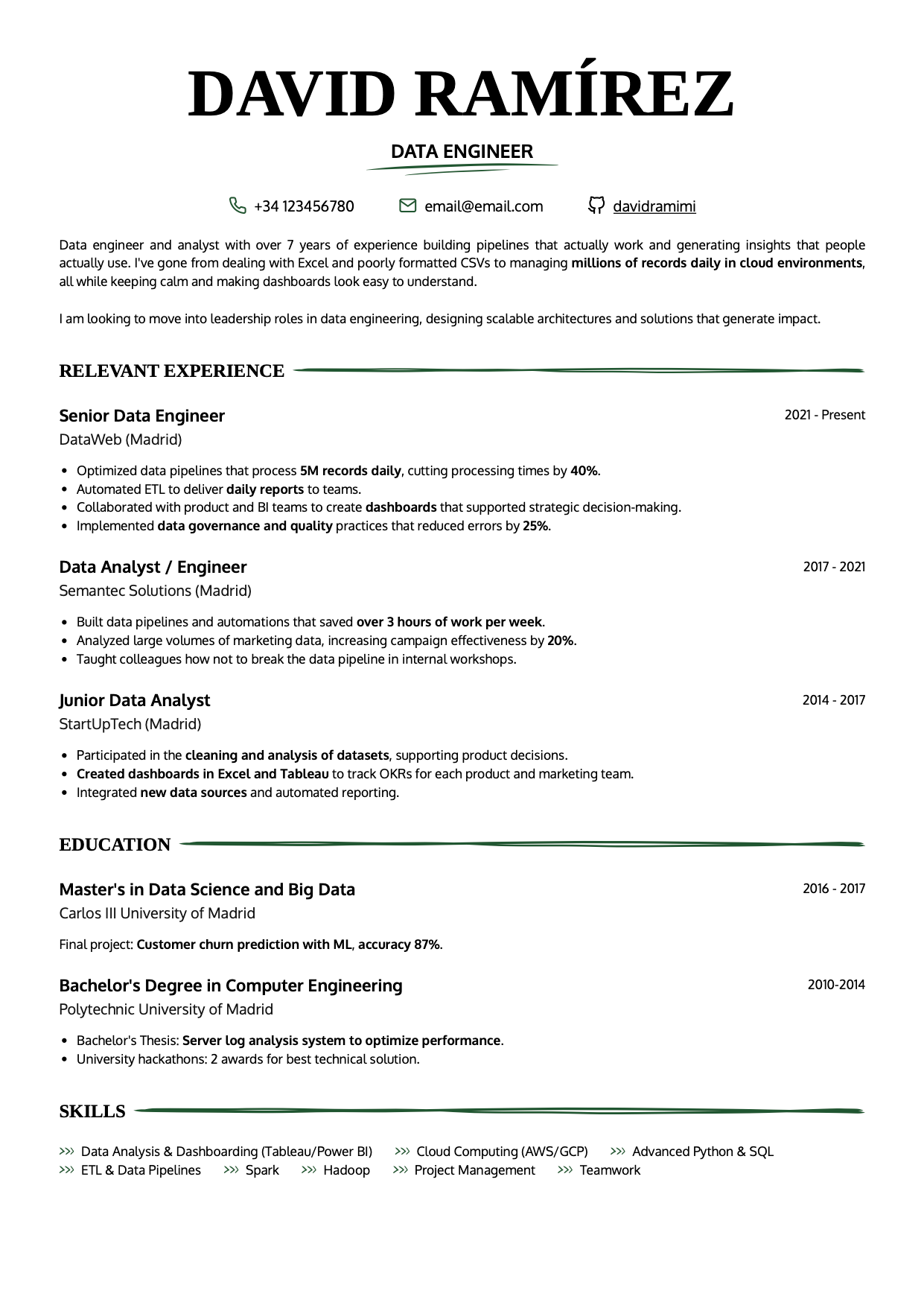 |
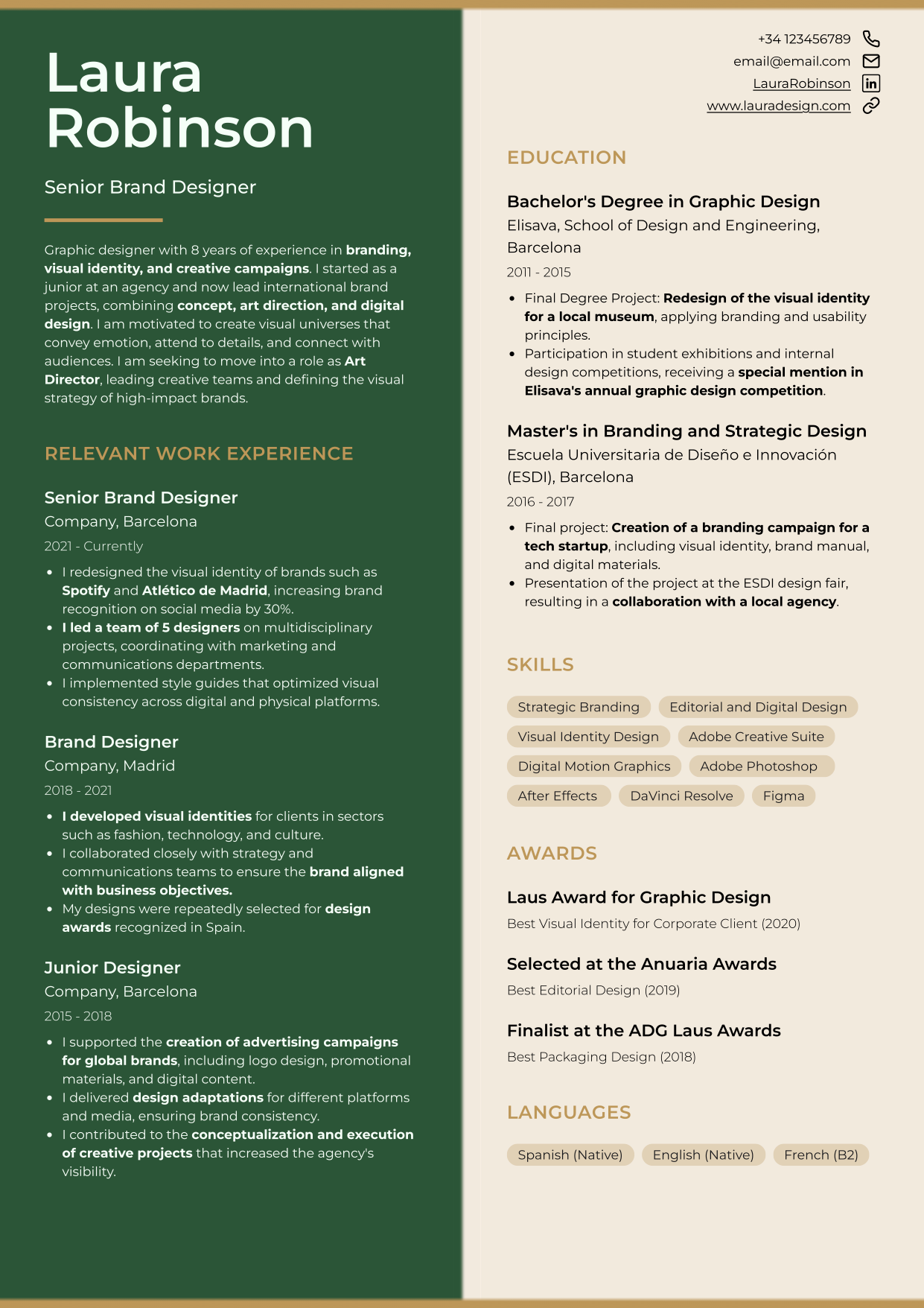 |
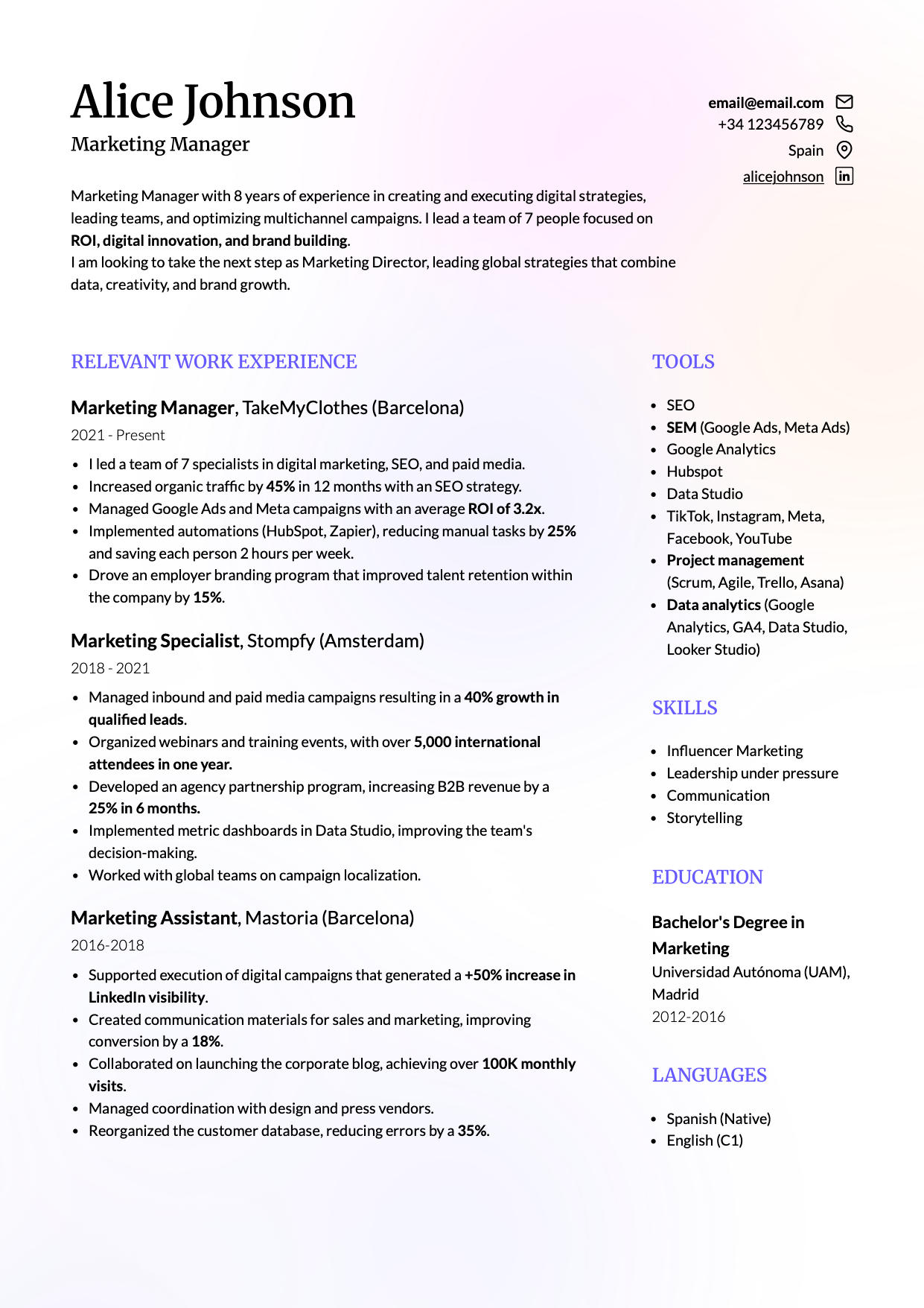 |
 |
ATS-friendly resume templates available in CandyCV
When a two-page resume is the right move (and when it isn’t)
Two pages are justified when you genuinely need space for your impact to make sense. Context can be necessary.
This often happens when you have:
- Several years of varied experience (multiple roles, industries, promotions, different tool stacks).
- Leadership scope: teams, cross-functional work, budgets, complexity… Where “what you did” needs context to be credible.
- A career story with shifts that require explanation.
The mistake isn’t having two pages, but using the second page as a landfill: repetitive bullets, unnecessary sections, and vague fluff. That damages your narrative and signals you don’t know how to prioritize.
A simple structure for a strong two-page resume
Don’t treat this like a rigid formula. Use it as a sanity check:
- Page 1: a clear summary + your most recent experience (with impact) + core relevant skills.
- Page 2: earlier experience and relevant projects + education/certifications.
If you have little or no work experience, bring education and projects onto page one and ask yourself if page two is truly necessary.
Resume templates that work well for two pages
Sometimes your problem isn’t your content, but a template that forces you to cram, break reading flow, or waste space in the wrong places. This happens a lot with “design-first” tools. That’s one reason it’s often not a good idea to build your resume in Canva.
For a better decision framework, see: how to choose the best resume format for you.
Do ATS systems reject a two-page resume?
No. That’s a myth.
An ATS doesn’t downgrade you because your resume is two pages. What does hurt you is:
- You crammed the layout so much that the parser can’t clearly map sections and content.
- Your content doesn’t signal match for the job posting (keywords, relevant skills, real impact).
- Your template is not ATS-friendly.
In other words: you can have a one-page resume that fails if the formatting is messy or the template breaks parsing.
Don’t use page two to dump “whatever didn’t fit”
If your second page starts with:
- Old courses from years ago.
- Endless lists of tools or soft skills with no proof.
- Experience unrelated to your target role.
…you probably don’t need that page.
Page two must keep selling. Just like page one.
Three pages or more: only in specific cases
A three-page resume is rarely necessary. But a longer document can make sense if:
- You’re in academia/research and need publications, conferences, grants, and projects (that’s a CV, not a typical resume).
- Your role requires traceability and verifiable detail.
- You have public output where listing selected work is relevant.
If you’re not in those scenarios, go back to one or two pages without hesitation. And even if you are: you still don’t need to include everything. You need to organize it so it’s readable and prioritized.
How to shorten your resume without losing impact
Shortening isn’t “removing stuff.” You have to optimize for increasing the signal per line.
Step 1: Decide what must be clear in 10 seconds
Not “everything about you.” The first scan should make these things obvious:
- Your target role.
- Your specialty.
- Your impact (the kind of outcomes you create in the workplace).
Step 2: Replace duties with proof of capability
Duties don’t differentiate you. Impact does. What makes you stand out is:
- What you changed.
- What you improved.
- What you solved.
- How you measured it (when applicable).
- The constraints (only when context increases credibility).
Step 3: Cut by relevance, not by age
Older experience can be highly relevant if it proves something essential for your target role. Recent experience can be noise if it doesn’t support your positioning.
Your goal isn’t just to look “up to date.” Your goal is to look right for this job.
Practical ways to reduce resume length fast
- Merge repeated bullets. If you’ve done the same work at three companies, tell the strongest version once.
- Delete generic claims (“results-driven,” “team player”) unless you back them with evidence.
- Remove courses and tools that don’t support the target role.
- Don’t “fix space” by shrinking font size until it’s hard to read. Change the template or keep editing content.
You may also avoid adding personal details that don’t belong on a local resume (depending on where you are and where you are applying to, it can be things like photo, date of birth, marital status, etc).
Common mistakes that make resumes longer and weaker
Avoid these traps; they add noise, not credibility:
- Irrelevant experience: if it doesn’t support your target role, cut it.
- Dense blocks of text: if it’s hard to scan, it won’t be read.
- Generic descriptions: replace “responsible for sales” with specific outcomes (e.g., “grew revenue by X% by doing Y”). If you don’t have numbers, describe scope and results without making them up.
- Repetition: you don’t need to repeat the same skill across multiple sections.
- Outdated certifications: if it’s old and not important for the role, remove it.
- Templates that push you to fill space: in Europe, Europass is a common example of this. If you’re using it, know it’s often not the best option: Europass CV: why it no longer works.
Add links instead of adding pages
A lot of the “one vs two pages” stress is really: “I want them to know more about me.”
Your resume is not the place to tell your full story. So do this instead: keep the resume as the decision document, and link out to depth.
Useful links to include on your resume:
- LinkedIn (well-optimized and consistent with your resume): how to optimize your LinkedIn profile.
- Portfolio / GitHub / personal site (clean, obvious link).
A one-page resume with good links often beats a two-page resume that’s basically “here’s everything I’ve ever done.”
Final checklist: pick your resume length in 60 seconds
Think of your resume as a tool to earn interviews.
-
Do you have 0-5 years of experience or a fairly linear path?
Almost always one page. Early-career resumes get long out of insecurity, but what you usually need is focus.
-
Do you have experience and a clear target role, and you can tell what’s relevant?
One page if you can edit well. Two pages if it genuinely doesn’t fit without destroying the narrative or cramming the layout (that’s the worst outcome).
-
Are you senior, where your value isn’t “I worked at X” but “I changed Y”?
Two pages is normal. The goal isn’t “say more.” It’s prove more.
-
Does your field require verifiable detail (research, academia, publications, patents, some highly specialized engineering/legal tracks)?
Two pages, sometimes three, but prioritize hard and keep it readable. And in many of these cases you may need a CV, not a resume.
-
Do you think you need more pages because you don’t know what to cut?
Then you don’t need more pages. You need better prioritization.
It’s not about pages, it’s about value
So, how many pages should your resume be? The right number is: as many as it takes to prove fit and impact without noise.
If you can tell your story in one sharp page, do it.
Your resume should be:
- Brief, but intentional.
- Clean to scan, heavy on impact.
- Part of a wider ecosystem that shows who you are and what you can do.
FAQs
Does a resume have to be one page?
No. One page is a preference, not a rule. One page is ideal when it lets you prove fit and impact without sacrificing readability. The moment you’re forced to shrink font, cram margins, or cut the strongest proof you have, use two pages.
Use one page when your story is straightforward and you can show enough evidence. Use two pages when you need space to make your value make sense.
Is a two-page resume OK?
Yes, as long as the second page is doing real work. Two pages is normal for experienced candidates, technical roles, leadership, or anyone whose scope needs context (systems, cross-functional impact, revenue/efficiency outcomes, complex projects).
Two pages is not OK when page two is basically:
- A dumping ground for old courses.
- A spreadsheet of tools.
- Soft skills with no proof.
- Unrelated or old roles that don’t support your target job.
A good test: if you deleted page two, would your candidacy feel weaker? If the answer is “not really,” you don’t need it.
When does a three-page resume make sense?
Almost never for standard job applications. Three pages tends to signal poor editing, not “more experience.” It can make sense in a few specific cases, though:
- Academia/research (where you’re really writing a CV, not a resume).
- Publication-heavy profiles (peer-reviewed work, conferences, grants).
- Roles requiring traceability and detailed project documentation (some specialized research, government/contract work, or extremely niche technical tracks).
Even then, you still don’t include everything. You prioritize and structure so the first page carries the decision-making weight.
What’s the difference between a resume and a CV?
It depends on where you are. In the US:
- A resume is the standard document for most jobs. It’s targeted, impact-focused, and usually 1-2 pages.
- A CV (curriculum vitae) is mainly for academia, research, and some medical/scientific roles. It can be longer and includes things like publications, conferences, grants, teaching, and research projects.
In much of Europe (and often the UK), “CV” usually means what Americans call a resume.
So if you’re European and you say “CV,” you probably mean a 1-2 page job application document. In the US, if you submit something labeled “CV” for a standard corporate role, some recruiters may assume it’s academic-style (long, publication-heavy) and that you don’t know the local convention.
Do ATS systems penalize long resumes?
Not for length by itself. An ATS doesn’t “get annoyed” because you used two pages. What hurts you is when length correlates with problems like:
- messy formatting that breaks parsing
- unclear section structure (so content gets misclassified)
- low match signal (no relevant keywords, weak role alignment)
- fluff-heavy bullets that don’t prove anything
So the real risk of a long resume is usually quality, not page count. A clean two-page resume can scan and parse better than a cramped one-pager.
Can I compensate for a shorter resume with LinkedIn or a portfolio?
Yes, and it’s often the smartest strategy. Think: resume = decision summary, LinkedIn/portfolio = depth.
A strong setup looks like this:
- Your resume tells a coherent story fast: role, specialization, impact.
- Your LinkedIn reinforces it (same positioning, consistent dates/titles, aligned keywords).
- Your portfolio/GitHub/site shows proof (work samples, case studies, public output).
One warning: don’t use LinkedIn/portfolio as an excuse to keep a vague resume. The resume still needs enough evidence to earn interest. Links should strengthen credibility, not replace it.
We're two product builders who care about quality, taste and doing things right. We want you to get that job you want, plain and simple. That's why we are building CandyCV to help you create a great resume and land a job for free. If you give us a try (and feedback!), we'll be forever grateful 😊
Alba Hornero
Co-founder and Employability Expert
As CandyCV’s co-founder and a former product lead in HR tech, I’ve built ATS tools, optimized hiring processes, and interviewed hundreds of recruiters. I personally write every post with the intention to provide real, high-impact job search advice that truly helps you land your next role.
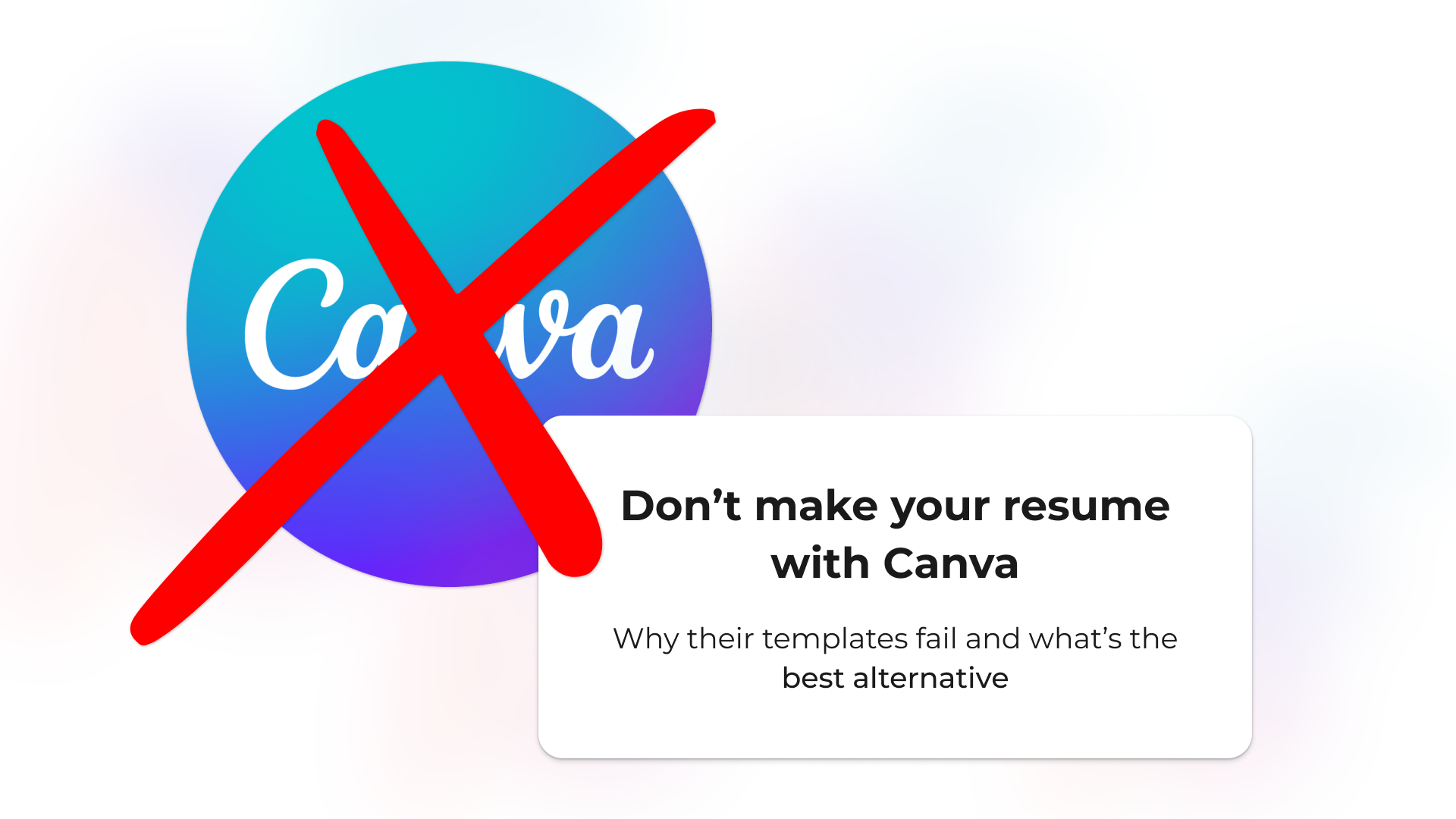
Don’t make your resume with Canva: why its templates fail and what to use instead
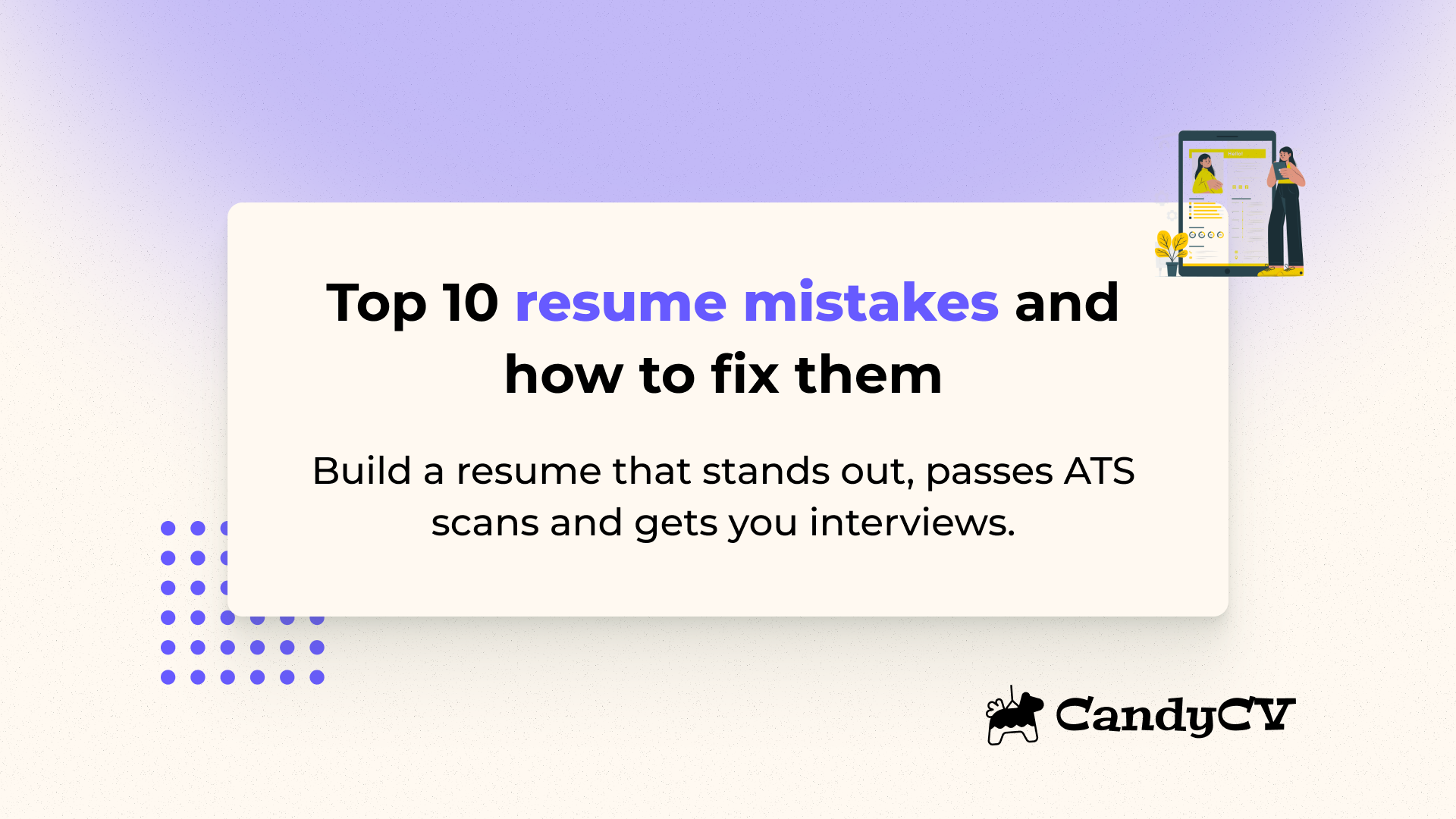
Top 10 common resume mistakes to avoid and how to fix them
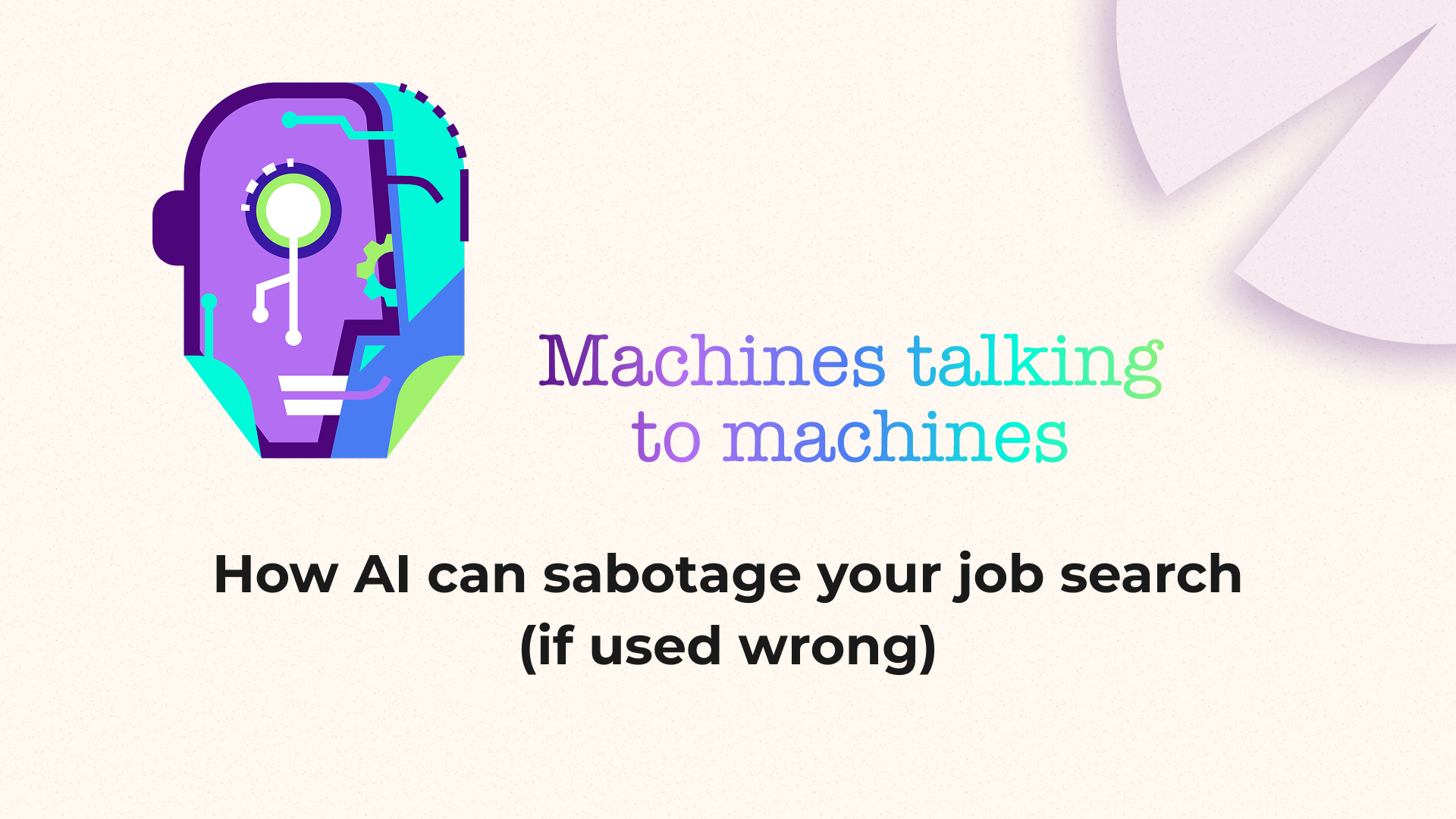
Machines talking to machines: how AI can sabotage your job search (if used wrong)
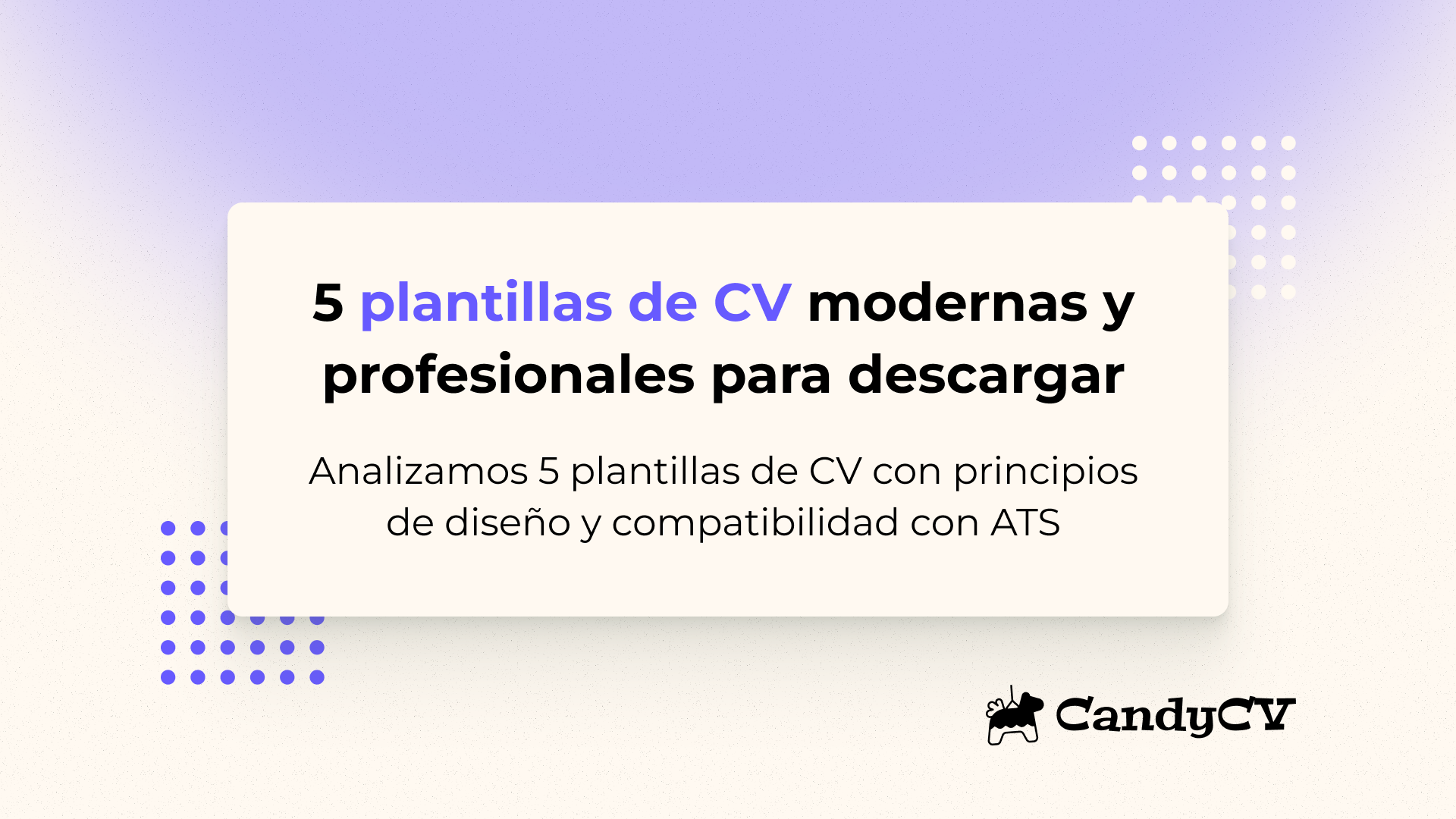
Download 5 free modern and ATS-friendly resume templates (design analysis)
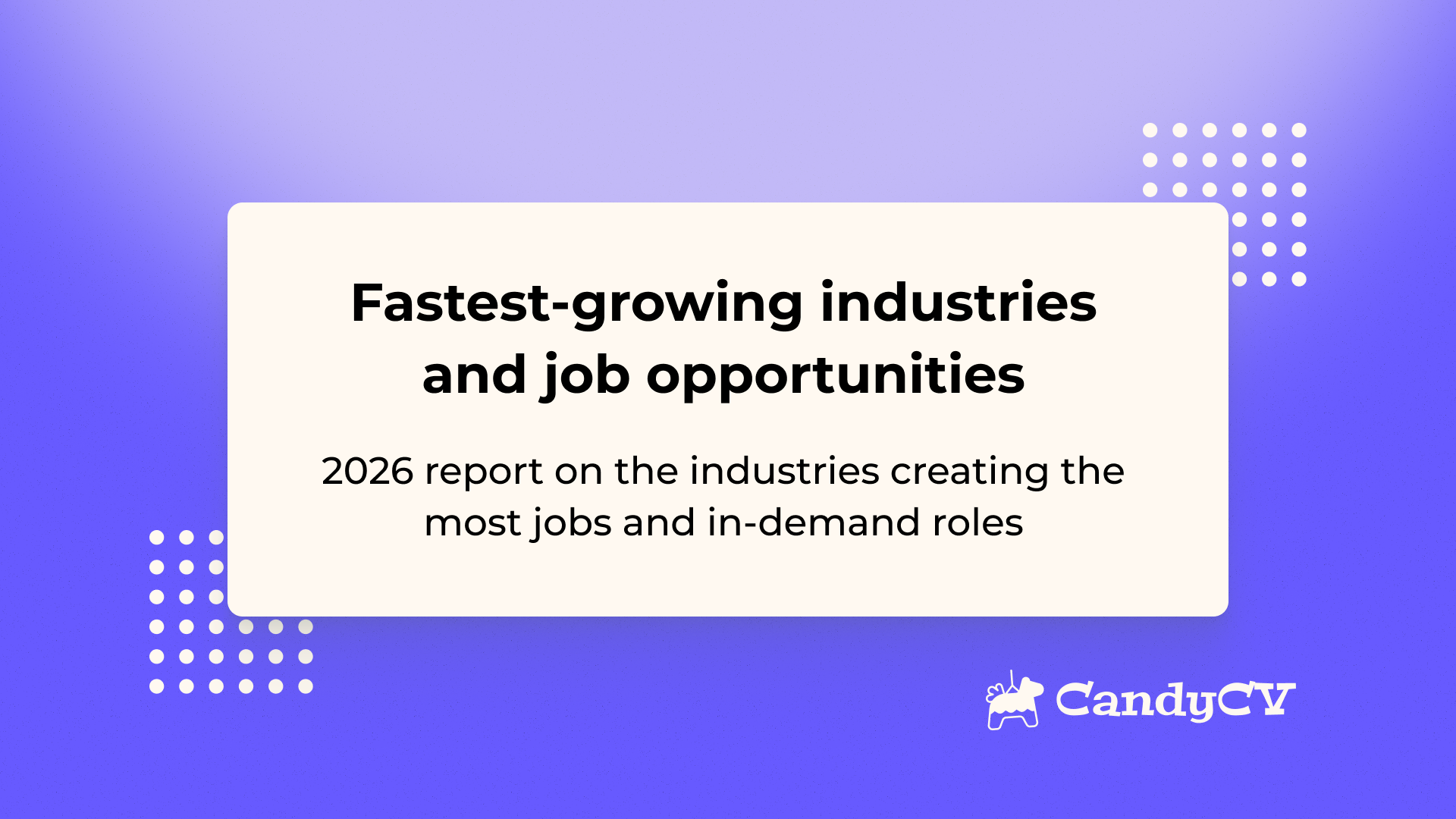
Fastest-growing industries and job opportunities: analysis and in-demand roles
